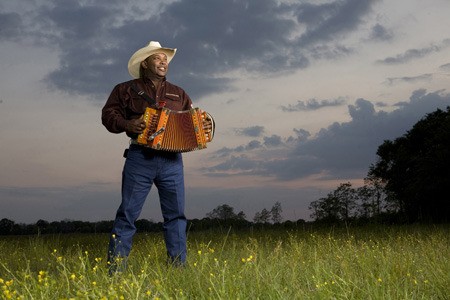When Jeffery Broussard plays the accordion, he plays it with his whole body. And his toe tapping, hip shaking and exuberant shoulder shrugging is contagious. His numerous YouTube videos all have one thing in common – a room full of folks swaying and clapping their hands as zydeco and Creole melodies fill the air.
Broussard is easily recognized in any of his shows as the one with a joyful smile, cowboy hat, button up shirt, jeans and a toothpick dangling from the corner of his mouth, which he does not remove even when belting out tunes.
“I’m hoping that people will get that glimpse into an authentic part of that world through his performance, it’s a pure shot at what he does,” said Orcas Center Director Kara O’Toole.
You can see Broussard and the Creole Cowboys for their first island performance on Friday, March 23, 7:30 p.m. at Orcas Center.
The center is partnering with the Lower Tavern for burgers and brew, $15, followed by zydeco dance lessons taught by Broussard in the Madrona Room at the center.
“Zydeco is kind of like line dancing. So people can get up and move around during the show,” said O’Toole. “We thought it would be fun.”
Zydeco, a uniquely American form of roots or folk music, evolved in southwest Louisiana in the early 19th century from forms of Creole music. Usually fast tempo and dominated by the button or piano accordion and a scrub-board, zydeco music was originally created at house dances, where families and friends gathered for socializing. The word zydeco comes from “Les haricots sont pas sales,” a French phrase meaning “the snap beans aren’t salty” – referring to times of poverty, when people couldn’t afford salt to flavor their food. The term Creole has many meanings, including native, homegrown, or a person of mixed European and black descent.
In a KPBS radio interview, Broussard said he plays Creole music because he doesn’t want to let the culture, which has been handed down through generations in his family, to pass away.
“Jeffrey is the real deal, his upbringing combined with his commitment to sharing zydeco and Creole culture – it’s his life’s mission,” O’Toole said. “He can take his music to any venue, it’s so innate within him.”
Jeffery Broussard’s History
Broussard is known as the leading member in Zydeco Force, an influential band at the forefront of the “new” zydeco movement, black American dance music originally from southern Louisiana. His accordion and vocals defined this new style of Creole music, incorporating the soulful sounds of R&B into contemporary zydeco music and dance.
He has a range seldom seen in zydeco – from traditional songs from the old masters to originals, single-note and triple-note accordion to fiddle.
Broussard hit the stage at age eight, playing drums in his father’s band, the Delton Broussard and The Lawtell Playboys, where he was exposed to some of the great Creole fiddle players of that time. When he wasn’t playing music he was on the family farm digging and sorting potatoes, and by the time he reached seventh grade he quit school to work and help make ends meet. During his teen years he played with his brother’s band, but was too shy to sing until he was older.
Now his resume includes tours around the world and numerous awards including “Best Zydeco Album” by offBEAT Magazine. When he’s not playing he’s giving accordion lessons.
O’Toole said that the accordion is not seen often in mainstream music, but it is a fascinating instrument – especially when Broussard plays.
“It will be an awesome show,” O’Toole said. “Maybe even bringing music that people have never heard before.”
Janet Baltzer, director of the Lopez Center for Community and the Arts, where Broussard will play on Sunday night, said having such music on the island is really a merging of two cultures.
She added that even the instruments themselves offer a window into another world – like the scrub board not heard often in the Pacific Northwest.
Clifton Broussard, Jeffrey’s brother, plays the unique instrument, and does it with an interesting array of objects including spoons, drumsticks, or eggbeaters.
“You can sit and listen or dance your heart away,” Baltzer said. “We are fortunate as a community to have someone like Broussard come and bring his art and talent and culture to us.”
Tickets are $25, $19 for Orcas Center members, and $11 for students.



